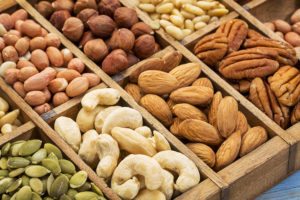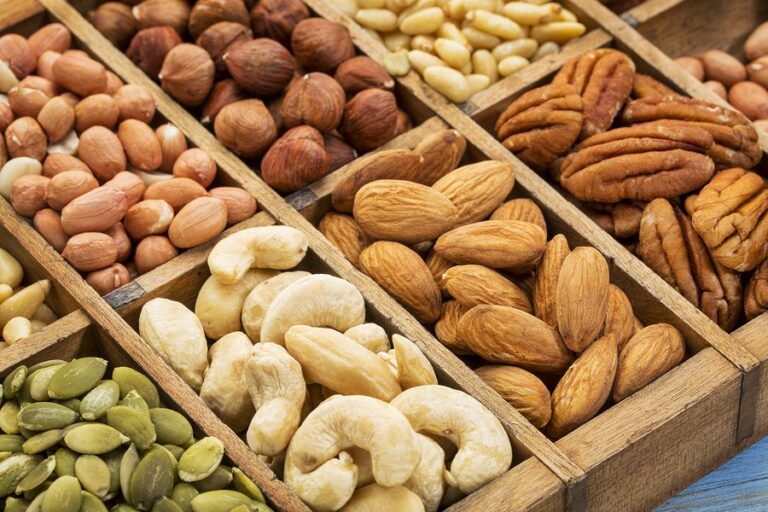It’s no surprise that nuts are making a dietary comeback after several decades of being labeled as unhealthy or fattening. In fact, new studies show that regular nut consumption can have a positive impact on everything from heart health and hypertension to boosting metabolism and lowering cholesterol. They’ve even been touted as an excellent source of fiber, vitamins, minerals, protein and antioxidants. Anyone involved in senior care can immediately see the advantages of adding nuts to daily nutrition goals.

While a healthy diet is important at any age, seniors can really benefit from nutrient dense foods like nuts as their appetites can diminish and they may not eat as well as they once did. There’s no better time to go nuts for nuts, especially in a senior citizen’s diet.
Here’s a quick overview of 5 nuts and the healthy impacts they have:
Peanuts: As one of the country’s most consumed nuts, peanuts are a good source of folate, niacin, protein and vitamin E, and an array of other nutrients. While they are primarily eaten in butter form or as a dry-roasted snack, peanuts have a big place in Southeast Asian-style cooking and more.
Almonds: While almonds are an excellent snack on their own, they are ideal when included in a range of recipes as slivered, chopped, crushed and even powdered varieties. Almonds contain plenty of vitamin E, fiber, protein and magnesium. Don’t forget about delicious almond nut butter as an alternative spread for peanut butter.
Walnuts: Few nuts pack as powerful of a nutritious punch as walnuts do. They have one of the highest levels of antioxidants and provide plenty of omega-3 fats, as well as copper, manganese and biotin. Good for the heart, brain, hair and skin, walnuts are truly one of nature’s superfoods. All it takes is about an ounce per day (around 7 shelled walnuts) to reap the benefits.
Pistachios: Easy to identify thanks to their distinctive green color, pistachios are extremely good for your health. Pistachios deliver the highest levels of vitamin K and potassium of any nut, and they are also among the lowest in overall calories. Along with fiber, protein and a number of other nutrients, pistachios are ideal as a snack or as an ingredient in a range of recipes.
Cashews: Flavorful, buttery cashews have one of the lowest fat contents of the nut family, with most of it being monounsaturated fat—the heart-healthy kind. Cashews also provide lots of minerals the body needs like copper, magnesium and zinc. Whether eaten raw, crushed or as a flavorful nut butter, cashews can have a big impact on overall health.
In order to enjoy all the health benefits of nuts, seniors should stick to the appropriate serving size, of about 1.5 ounces per day. For nut butters, that’s about 2 tablespoons. Because of the high calories associated with nuts, eating too much can result in weight gain. As part of a balanced diet, seniors can reap the benefits that nuts bring to any meal and the best part is they can be prepared to satisfy any preference. There’s no better time for family caregivers and home care aides to incorporate nature’s superfood into the dietary rotation as part of a senior care plan and help elderly loved ones go nuts for nuts.
If you or an aging loved one needs senior care in Roseville, CA, remember Senior Home Care Services. Call us at (916) 514-7006 for more information.
Source:
https://www.ncbi.nlm.nih.gov/pmc/articles/PMC3257681/
- Four Ways to Celebrate Spring With Your Homebound Elderly Loved One - April 2, 2025
- How 24-Hour Home Care Can Help Your Senior Parent Live At Home - March 27, 2025
- Common Foot Problems For Seniors With Diabetes - March 18, 2025


